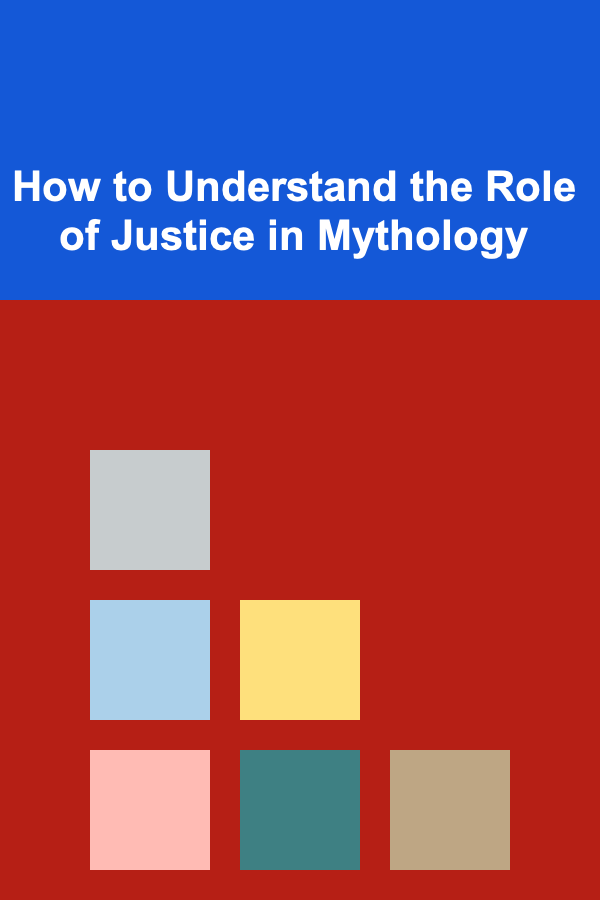
How to Understand the Role of Justice in Mythology
ebook include PDF & Audio bundle (Micro Guide)
$12.99$6.99
Limited Time Offer! Order within the next:

Justice is a complex and multifaceted concept that has evolved across cultures and societies. It plays a crucial role in shaping the moral, social, and legal fabric of societies. In mythology, justice often takes on symbolic and divine forms, intertwining with themes of fate, morality, punishment, and the balance of cosmic order. By exploring the role of justice in mythology, we can gain a deeper understanding of how ancient cultures perceived the forces that governed human behavior and the universe.
Mythology, by its very nature, reflects the values, beliefs, and concerns of the societies from which it originates. Whether through gods, heroes, or mythical creatures, justice is depicted in various forms---some of them stern, others merciful, and still others, ambiguous. Ancient myths were not just stories; they were the guiding principles for understanding right and wrong, order and chaos, virtue and vice.
In this article, we will explore how justice is portrayed in different mythological traditions and how it functions within these stories. We will look at the relationship between gods and humans, the concept of moral accountability, and the consequences of injustices committed by mortals and deities alike.
The Divine Justice of Ancient Greece
Greek mythology provides some of the most vivid depictions of justice, often through the actions of gods like Zeus, Athena, and Nemesis, as well as through the stories of mortals who face divine retribution. Justice in ancient Greece was not a static or predictable system; it was deeply intertwined with the whims of the gods and the fates of mortals.
Zeus and the Concept of Cosmic Justice
Zeus, the king of the gods, embodies the idea of divine justice in Greek mythology. His role as the overseer of order in the universe, particularly in terms of ensuring that mortals and gods alike act in accordance with a cosmic moral code, places him at the center of the idea of justice. Zeus was responsible for enforcing laws that governed both the heavens and the earth, dispensing punishment and rewards based on an individual's actions.
The myth of Zeus and Prometheus provides a perfect example of this divine justice. Prometheus, a Titan, defied Zeus by stealing fire from the gods and giving it to humans. In response, Zeus imposed a harsh punishment on Prometheus, binding him to a rock where an eagle would eat his liver daily. This punishment served as a reminder of the consequences of defying divine order.
However, the story of Prometheus also illustrates the tension between justice and mercy. Prometheus' eventual release by Heracles, a hero, shows that justice can evolve and that mercy can sometimes override harsh punishment. This complexity reflects how justice in Greek mythology was not just about punitive action but also about balance and, at times, compassion.
Athena and the Pursuit of Wisdom in Justice
While Zeus represents the force of cosmic justice, Athena, the goddess of wisdom and warfare, offers another perspective on justice. Athena's role is often to provide guidance and counsel, helping both gods and mortals navigate difficult moral decisions. Her wisdom in achieving justice is evident in stories like that of the trial of Orestes.
In the myth, Orestes is pursued by the Furies after avenging his father's murder by killing his mother, Clytemnestra. Athena intervenes by establishing the first trial by jury, providing a mechanism for justice that takes into account the complexities of human actions. Athena's role in this myth reflects the idea that justice should not be blind but informed by wisdom, reason, and the opportunity for redemption.
Nemesis: The Goddess of Retribution
Nemesis, the goddess of retribution, represents the idea that justice is not just about rewarding virtue but also about punishing vice. Nemesis ensures that no mortal or god becomes too powerful or arrogant without facing consequences. She is often depicted as the force that brings balance when excess is allowed to flourish.
The myth of Narcissus, who falls in love with his own reflection, is an example of Nemesis's role in justice. Narcissus's self-obsession leads to his downfall, a punishment that is both poetic and just. Through such stories, Nemesis represents the inevitable correction of moral imbalances, emphasizing that justice involves restoring equilibrium.
Justice in Norse Mythology: Vengeance and Honor
Norse mythology provides a different lens through which to understand justice. The concept of justice in the Viking Age was often closely tied to vengeance, honor, and personal retribution. Unlike the Greek model, which places divine authority at the center, Norse justice is often depicted as a more human-driven pursuit.
The Role of the Aesir and the Vikings
In Norse mythology, the gods, particularly Odin, are deeply involved in the fate of humanity. Odin, as the all-father, is a complex figure who both seeks wisdom and exacts justice. However, justice in the Norse tradition often involves revenge and the pursuit of personal honor. This is evident in the myth of the death of Baldr, Odin's son, who is killed through the treachery of Loki.
Baldr's death sets off a chain of events that eventually leads to the downfall of the gods themselves in the Ragnarok, the end of the world. The cycle of vengeance that starts with Baldr's death illustrates the Norse idea of justice as something cyclical and often violent, driven by personal and familial obligation rather than a universal moral order.
Honor and Retribution in Viking Culture
For the Vikings, justice was often tied to a warrior's sense of honor and the need to avenge wrongs. This cultural emphasis on personal retribution is reflected in stories of vengeance and blood feuds, such as the saga of Sigurd the Dragon Slayer. Justice, in this context, was about righting perceived wrongs through action, often leading to a cycle of violence that was both tragic and inevitable.
The concept of "wergild," or the payment of blood money, is another example of Norse justice. In Viking culture, wergild was a way to compensate for a murder or injury, providing a form of restitution that prevented further bloodshed. This system reflects a pragmatic approach to justice, where the balance of wrongs and rights was often settled through compensation or the threat of violent retribution.
Eastern Perspectives on Justice: Karma and Cosmic Balance
In Eastern mythology, particularly in Hinduism, Buddhism, and Jainism, justice is often viewed through the lens of karma and cosmic balance. The idea of karma, the law of cause and effect, provides a framework for understanding justice that transcends individual actions, encompassing the entire universe.
The Concept of Karma in Hindu and Buddhist Mythology
Karma is a central concept in many Eastern mythologies, and it represents the idea that every action has consequences. In Hindu and Buddhist traditions, justice is not always dispensed by gods but is a natural force that ensures moral balance. The notion of karma dictates that good actions lead to positive outcomes, while bad actions result in suffering and misfortune.
In the Hindu epic, the Mahabharata, justice is a recurrent theme. The epic tells the story of the Kuru dynasty, which is torn apart by the conflict between the Pandavas and the Kauravas. The actions of both sets of cousins result in significant suffering, and the idea of cosmic justice is woven throughout the story, with characters experiencing the fruits of their karma. Krishna, the god of compassion, serves as a guide to the Pandavas, helping them navigate moral dilemmas and ensuring that justice is ultimately served.
Similarly, in Buddhist mythology, karma plays a crucial role in understanding the fate of beings across lifetimes. The belief in samsara, the cycle of birth, death, and rebirth, suggests that individuals are responsible for their actions in this life, and their karma will affect their future lives. This understanding of justice is not punitive in the traditional sense but is rather a natural law that ensures individuals experience the consequences of their actions in the fullness of time.
The Ambiguity of Justice in Mythology
Despite the many examples of justice in mythology, it is important to recognize that justice is often portrayed as ambiguous. In many myths, the gods and heroes are not always clear-cut in their motivations or actions, and justice is sometimes served in ways that challenge our conventional understanding of right and wrong.
The Justice of the Gods
In many myths, gods and goddesses dispense justice, but their actions are not always fair by human standards. For example, the gods of Olympus often punish mortals for their flaws or defiance, yet they themselves are sometimes guilty of the same behaviors. This creates a paradox in the mythology---justice is not always impartial, and the gods themselves are subject to the whims of fate and their own desires.
The story of Medea, a tragic heroine in Greek mythology, is a prime example of this ambiguity. Medea's justice, driven by her betrayal and rage, leads her to commit terrible acts, including the murder of her children. Yet, her actions are presented in such a way that the audience may question whether she is a victim of divine and human injustice or whether her vengeance is justified.
Conclusion: The Role of Justice in Understanding Mythology
Justice in mythology serves as a mirror to human concerns about morality, fate, and the divine. It is a concept that is often complex, contradictory, and deeply rooted in the cultural, religious, and social contexts in which myths are created. Whether it is through the divine retribution of the Greek gods, the cycles of vengeance in Norse mythology, or the natural law of karma in Eastern traditions, justice remains a central theme that helps shape the moral and ethical fabric of mythical narratives.
By understanding the role of justice in mythology, we can better appreciate how ancient cultures grapples with the complexities of human behavior and the forces that govern the universe. Justice in mythology is not just about punishment or reward but is a lens through which we explore themes of balance, morality, and the consequences of our actions. As we continue to engage with these ancient stories, the lessons of justice remain timeless and relevant, offering valuable insights into the human experience.

How to Organize a Potluck Party That Feels Like a Feast
Read More
How to Set Up a Family Art Gallery with Homemade Creations
Read More
Monetizing Deep Learning Models for Recurring Revenue
Read More
Recruiter Secrets: Navigating the Modern Hiring Process with Expert Tips
Read More
Mindfulness for Decision Making: A Deep Dive
Read More
10 Tips for Securing Your Digital Legacy Before Retirement
Read MoreOther Products

How to Organize a Potluck Party That Feels Like a Feast
Read More
How to Set Up a Family Art Gallery with Homemade Creations
Read More
Monetizing Deep Learning Models for Recurring Revenue
Read More
Recruiter Secrets: Navigating the Modern Hiring Process with Expert Tips
Read More
Mindfulness for Decision Making: A Deep Dive
Read More